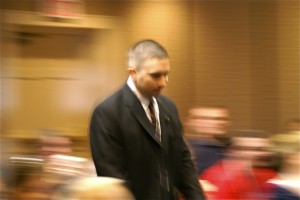
Is the world changing, or is it us?
Let me tell you how I was first chosen to be an educator early in my career…
I was the guy would read the book, and, more importantly, I didn’t mind standing in front of a group of people and talking. From my perspective this was great! I actually enjoyed talking with people, and being brand-new I had a ridiculous amount of enthusiasm for everything we did in emergency services. Being selected to be an educator encouraged me to learn all that I could about each subject that I was about to teach. I knew that I could really turn emergency services education on its head by bringing tech into the classroom. That’s right, I printed out my own overheads from the computer. In color!
This allowed me to use the best practices of education at the time, standing in front of students and lecturing so that they would absorb my knowledge on a particular topic.
Now things are different.
-We know that’s not the best way.
Many would say that, in fact, it’s the worst way. And while different branches of emergency services are in different stages of developing their educational paradigms, EMS especially is confronted with dramatic change, particularly because of the EMS educational standards.
Even for those of us who agree philosophically, it’s very difficult for many experienced educators to completely change not only the way we teach, but the way that we think about teaching. The funny thing is, I don’t think this is a result of us NOT wanting to change, I think it’s a result of how we’ve changed as educators.
Remember that sparky young educator I mentioned at the beginning of the article? You may recognize him, or at least a part of him, in the way perhaps that you were as a newly minted instructor. Remember how we were going to change the world? Remember how we didn’t understand why the senior instructors refused to listen to all the big changes and our new ways of doing things? If you’d asked us then to list the core components of emergency services education, I can almost guarantee you that one of those would’ve been “embracing change and lifelong learning”.
So how has it become so difficult for so many of us to change what we teach:
- Direct fire attack, you can’t “push” fire.
- Spinal immobilization, backboards often do more harm than good.
- Sometimes administering oxygen can do harm.
As well as how we teach:
- Statements should come from the students, questions should come from the teacher.
- Smart phones and social media belong in the classroom.
- A syllabus should be based on student competency, not hours of “ass in seats”.
I believe that for many of us, as we gained more experience we also narrowed our comfort zone. The worst of us may be in a rut, but even the best of us are finding it challenging to implement these changes.
So what is the answer?
To be honest, the many challenges we face will require many, varied solutions. There is no single roll of duct tape that’s going to fix this crack in the educational system.
I bring it up because I’m worried that many experienced educators, with years of valuable, irreplaceable knowledge, will become overwhelmed and leave the field. Don’t get me wrong, I believe that the new ways are better and that we need to change, but I also believe that the transition to those new ways must be led by the senior educators. These are the people with the knowledge, experience, and authority that is needed for the success of these new models of education in emergency services. We have to remember that “lifelong learning” is also required of all educators and isn’t always easy.
So if you’re new educator, don’t try and steamroll over the senior people because they don’t already know all about student centered social mobile online whatchamacallit. And for senior educators and staff in police, fire, and EMS, please continue to bring your knowledge and experience into the classroom, even if you have to stretch a little to do it in new and unfamiliar ways. Experienced people and new ways of teaching; emergency services needs both before going to meet the challenges that now face us.
 Rescue Digest Helping You Help Others
Rescue Digest Helping You Help Others